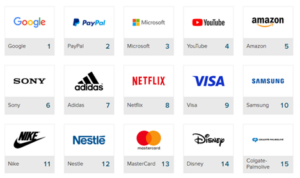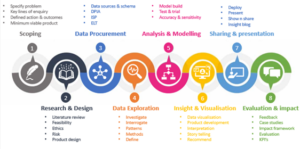As we approach another week of high temperatures how do you go about starting well to ensure you remain as cool and prepared as possible and what does it have to do with a data and analytics project lifecycle….
What do you think of when you consider these companies?

These are the 15 most trusted brands globally (based on 2021 data).
What attributes have secured these brands a worldwide ranking; quality, robustness, ethical, credibility, expertise and reliability are among a few features that spring to mind.
Learning from their success, we want data and analytics to be universally trusted. I have the pleasure of working alongside highly skilled data colleagues, considered as credible experts in our field, trusted and seen as a critical in helping our organisation secure positive outcomes for residents. Key to achieving this level of trust has been in ensuring our practices are robust. For us this means delivering best practice, quality, appropriate analytical and ethical principles to provide quality insight that adds value to our decision makers and helps our organisation to plan and prepare for the future.
Following a data project lifecycle from end to end ensures we are robust by being well-prepared and well scoped (starting well), deploying appropriate techniques to good quality data that is well informed (doing well), generating insight that is well valued (communicated well) and closing our projects well by following up on the impact (evaluating well).
Our Project lifecycle

Starting well
When you looked at the weather forecast at the beginning of this week you started preparing early for the heat by understanding your needs, speaking to members of your household, and keeping an eye out for expert advice and tried and tested tips to help you achieve your goal to keep cool. Hopefully you all have your windows and blinds shut to name a few of the basics!
Similarly, a good analytics and data science project also means starting with the end in mind and being aware of the end goal and key question that we need to address to help people achieve an outcome. Asking good questions, being curious about what someone is trying to achieve, why and what a good outcome looks like are all good starting positions for a scoping conversation. But we must also use our skills as researchers and analysts to find out what we, as an organisation, have tried before (and what worked/did not work/did not work then but ‘might’ work now). We can also look to the wealth of published literature, and what our local authority peers have done. Almost certainly the challenge you are setting out to tackle is one that many before you have attempted, maybe even solved. And equally as important, being aware of what data we have and the quality of this to help you assess what types of techniques you can apply and the feasibility of what is and isn’t possible is all part of our starting well phase to help us design a good output.
Doing Well
After we have a good understanding of the needs, data available, approaches and desired outcomes we start experimenting with the data and different models. Back to our endeavours to keep cool, during the last heat wave I put a frozen bottle of water in front of a fan but this week, thanks to iterative conversations with peers, I’m putting a frozen hot water bottle under my pillow at night!
Don’t be afraid to explore the data first, getting friendly with the patterns and outliers to help you test how you need to aggregate and group data to build effective models is time well spent. In this phase we define how accurate we need to be to get a good result and decide what specific methods are most suitable and what models we can build and test using a sample of data. During the doing well phase it’s good practice to keep testing out what you are finding with your audience and peers to help check and challenge your approach as you go and be transparent about what you are doing. This also helps to educate others and allows you to log and document as you go.
Sharing well
As we start to generate insight and answer the questions set out it’s crucial to communicate our findings and visualise our outputs. Data visualisations, product development is part of the sharing well phase, but it also requires us to interpret our findings and communicate them back to stakeholders in a way that is relatable, meaningful, accurate and valuable. At this stage you need to think about recommendations and how to triangulate quantitative findings with qualitative insight to add depth to your findings and build credibility. A memorable story can go a long way to helping your audience remember insights and inspire them to act, but make sure its accurate, credible, and complete, not just cherry-picking findings that they might want to hear or backs up your point.
Don’t forget to socialise and present your findings to many others who may be interested in what you have found so they can learn from your work. This might be the insights or key message uncovered or depending on your audience it might be the methods and how you developed a product that is useful to share with other analysts or data professionals. I know my friends were just as interested in how I kept cool during the last heat wave, but I tailored my messages differently to my colleagues who needed more confidence in the reliability of my methods before they adopted a recommendation.
Which brings us nicely to ending well
You might think well I’ve kept cool, and it’s been a good week so that’s it, but it’s just as important you end your project well by knowing what has been achieved. Following up with your stakeholders on what they have done with your insights, what action they were able to achieve and evaluating your work ensures we understand what impact it had. Even if it was a success or failure, we should be assessing our work to help us build consistency and measure the value and effectiveness we may have achieved so you know if the benefits outweigh the effort in future.
So, revisiting our goal of being a trusted brand for delivery of analytics and data science that helps secure better outcomes for our residents, we believe if we start well, do well, share well and end well we will have proven, documented, evidenced, and learned, iterating and growing as we mature as an organisation using data and analytics.
Over the coming months we will go into more detail about what we think best practice looks like for these different phases of our lifecycle, sharing our approach to becoming a trusted brand for analytics – not just across public sector but any sector. And hopefully we’ll stay cool in the process.
Leave a comment